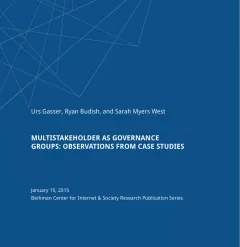
Multistakeholder as Governance Groups: Observations from Case Studies
This project explores existing multistakeholder governance groups with the goal of informing the future evolution of the Internet governance ecosystem. The research effort represents a globally coordinated, independent academic research pilot project by the Network of Interdisciplinary Internet & Society Research Centers (NoC) consisting of twelve case studies and a synthesis paper. The case studies examine a geographically and topically diverse set of local, national, and international governance models, components, and mechanisms from within and outside of the sphere of Internet governance. Key findings from these cases are summarized in a synthesis paper, which aims to deepen our understanding of the formation, operation, and critical success factors of governance groups and even challenge conventional thinking.
“[Our] analysis of a series of critical factors—including inclusiveness, transparency, accountability, legitimacy, and effectiveness— does not suggest a single approach that promises success across or even within governance contexts. While we cannot offer clear-cut ‘templates’ or ‘model groups’ based on our analysis, we instead offer observations and considerations with respect to a broad range of approaches, mechanisms, and tools and discuss these findings in the context of real-world situations.
“What then is the secret to a governance group’s success if it is not the application of a specific model or tool? Our case studies indicate that the most robust, effective, and legitimate groups are those that demonstrate sensitivity to the cultural environment in which they operate. In other words, it is attentiveness to both the ‘multi’ and the ‘stakes’ of ‘multistakeholder’—creatively and dynamically harnessing the multiplicity of forces and motivations into a collaborative body. This places a premium on leadership that can not only guide the group toward the its purpose, but can simultaneously and continuously screen the environment for enhanced sources of legitimacy, stabilizing relationships, and enabling partnerships.”
The synthesis and individual case studies are available for comment on Publixphere.
You might also like
- communityThinking of Algorithms as Institutions


